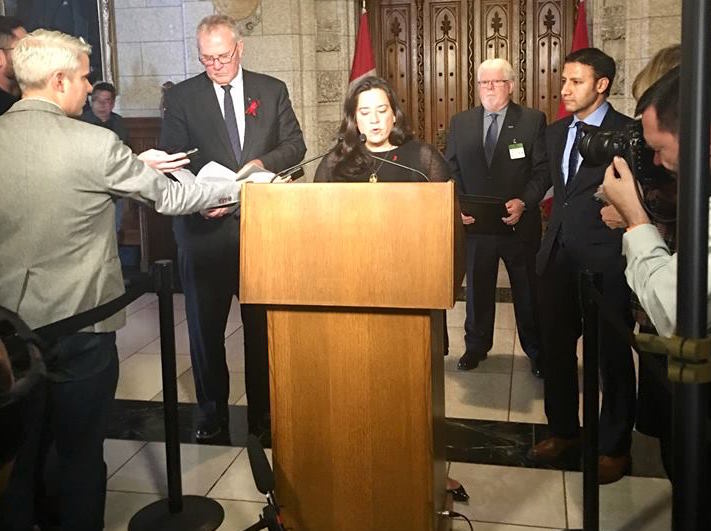It has been a hellish winter. Snowfall upon snowfall, followed by rain and ice, have plunged many into the doldrums. But as if to rescue us from the drudgery of an interminable winter, our mainstream media has staged a political drama, channelling attention away from routine woes to an all-consuming soap opera. Indeed, when news broke out that Canada’s former attorney general had submitted her resignation, many Canadians — pundits, news junkies, and more — were all atwitter. So loud was the din that it drowned out not only the cardinal’s first toots of the year, but also some less savoury truths that some would sooner not broadcast. Political truth has been a casualty in this whole affair, rendered virtually inaudible — like the cardinal’s piercing tweets of spring, muffled by yet another winter storm.
Jody Wilson-Raybould, whose name to date was relatively obscure, suddenly stepped into the limelight in late February 2019 — not, however, as a distinguished government figure, but as the target of political harassment. She claimed that she had been “hounded” and “pressured” by colleagues to intervene in the decision to prosecute SNC-Lavalin for its sundry crimes under the Harper government’s watch. Stung and aggrieved, she slammed the door shut, making her exit felt deeply throughout the corridors of Parliament and beyond.
Whatever actually transpired to prompt this resignation and its fallout is not certain. But Wilson-Raybould has nonetheless affirmed that hers was a principled move. And with this gesture she has won applause from Canadians of all stripes. Her recent testimony in the House of Commons has been, ironically, but not surprisingly, welcomed even by those inimical to feminism or to the plight of First Nations Peoples — by those clamouring to usurp power from the Liberals. (To be clear, I have no political party allegiance.) Those eager to bring down the Liberal government have resorted to posturing as “self-righteous” champions of justice, and/or as chivalrous knights of purity and salvation. These same parties (along with the media’s collaboration) have replicated and seized the righteous tone of Wilson-Raybould’s resignation, feeding off her indignation and self-portrayal as a truth-teller, authenticated by a matriarchal heritage.
Did Wilson-Raybould anticipate that she would win the recognition and sympathy of her own political adversaries, and this at the expense of her own party’s standing in the polls? If so, why has she not left the Liberal Party? Her actions, combined with her self-advertisement as a woman of ethical rectitude, raise questions of motivation, political constancy, principle — the principle of co-operation — and, not least, of universal (as opposed to self-serving) justice.
If some have genuflected before her political “heroism,” others have grown silent, reluctant to question her integrity lest they be accused of racial prejudice, injurious to Canada’s colonized Indigenous people. In this ambience of sanctity and reticence, my intervention here may read as blasphemy. I ask questions that some may consider heretical.
Do Wilson-Raybould’s recent words in the House match her deeds? What has been her track record as minister of justice? When, since 2015, has she demonstrated political principle and acted heroically on behalf of Indigenous peoples, marginalized groups, and less fortunate Canadians?
Did Wilson-Raybould voice her dissent on grounds of principle when the Liberal government refused to relinquish its $14-billion arms deal with Saudi Arabia, a country responsible for the starvation of countless Yemenite children?
Did she protest when her government spent “$110K in legal fees fighting a First Nations girl over [a] $6K dental procedure”?
Did she contest the government’s decision to take the Canadian Human Rights Tribunal to Federal Court “over a ruling last month that linked the suicide deaths in a northern Ontario First Nation with Ottawa’s inaction on implementing total equity in health-care delivery for Indigenous children”?
Among her greatest lapses as attorney general was her refusal to order a public inquiry into the conduct of officials in the justice department, persons who actively and knowingly abetted the wrongful extradition and psychological persecution of Hassan Diab, the iconic casualty of miscarried justice. When human rights groups petitioned the then attorney general to order a public inquiry into the suspicious actions of officials within the Department of Justice, Wilson-Raybould refused, ordering instead a review that will have surely exonerated the culprits. Declining to field questions in the House about the Diab affair, she closed the case with a perfunctory letter to Alex Neve of Amnesty International, while neglecting to offer a basic courtesy to Diab himself — an apology in writing. In all this, she failed miserably.
It behooves Canadians to look at politics as theatre — as a media-staged drama that, over the past few weeks, has swept many off their feet. Canadians ought to consider Wilson-Raybould’s testimony as a performance. For when “the lady doth protest too much,” there is reason to question the soundness of her truth.
Michelle Weinroth is an author and teacher. She writes extensively on political rhetoric.
Photo: Jody Wilson-Raybould/Facebook
Help make rabble sustainable. Please consider supporting our work with a monthly donation. Support rabble.ca today for as little as $1 per month!




